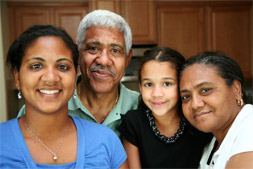Family Health History and the Holidays
Posted on by During the holiday season, many of us will be watching our favorite holiday movies for the umpteenth time. Some of our favorites (according to Gayot, Moviefone and Yahoo are Home Alone, A Christmas Story, A Charlie Brown Christmas, and It’s a Wonderful Life. Most holiday movies seem to have relatives as central characters and family gatherings as a major theme. One of the reasons that holiday movies may be so popular is they remind us of our own wishes and fears.
During the holiday season, many of us will be watching our favorite holiday movies for the umpteenth time. Some of our favorites (according to Gayot, Moviefone and Yahoo are Home Alone, A Christmas Story, A Charlie Brown Christmas, and It’s a Wonderful Life. Most holiday movies seem to have relatives as central characters and family gatherings as a major theme. One of the reasons that holiday movies may be so popular is they remind us of our own wishes and fears.
We all have wishes and fears related to our family’s health: the hope that one of our nieces who is pregnant will have a healthy baby, or the fear that this may be the last time we’ll be able to spend the holiday with our father, who was recently diagnosed with cancer. We’d like to encourage scriptwriters and producers to consider including one or more scenes discussing and collecting family health history in future holiday movies. The scenes could involve families from any sociodemographic, ethnic, religious or cultural group, and could have any number of different holiday traditions.
While we’re waiting for Hollywood to produce family health history scenes, we’d like to encourage all families to create their own holiday tradition by taking time to collect, discuss, document, and share their family health history. Many of us will be visiting with our families this holiday, sitting together recalling and laughing about past holidays. This is the time we finally get to hear about a cousin’s new job, an uncle’s travels over the past year, and everyone’s plans for the future. We may see a brother who is recovering from an early heart attack, or a grandmother with diabetes. It is also a time to remember those who are missing from the table. Remembering our loved ones builds connections to the past, especially for children in the family.
Family discussions are important not only to strengthen our ties and support family members, but also for our own health and the health of our family members. Shared stories can be a starting point for gathering family health history information to share with a health care provider. Family health history offers signposts that might point to increased risks for various diseases. It is most important to know the medical history of first-degree relatives, including our parents, siblings, and children. The medical history of our grandparents, grandchildren, aunts, uncles, nieces, nephews (second-degree relatives) and cousins (third-degree relatives) is also important. The US Surgeon General has created an online tool to capture family health history which can be found at: https://phgkb.cdc.gov/FHH/html/index.html 
Important information to document includes:
- Family’s ancestry/ethnicity
- Age and cause of death of family member(s)
- Age that family member was diagnosed with medical condition(s)
- Number of family members(s) affected with medical conditions
Based on national and state surveys, over 96% of us believe that family history is important to our health. However, only one-third of us have actively collected our own family health history. Medical chart reviews suggest that health care providers often fail to record the age that a relative was diagnosed. Capturing the age of onset is vital for determining possible risk based on family history, since earlier onset is correlated with higher risk to other family members for most common chronic diseases such as cancer, heart disease and diabetes.
The holidays are a time of joy and sorrow, especially for families who have lost a loved one, but they can also be a time of discovery. Telling stories about those who have passed away helps to keep their memories alive. As we share meals and memories, and even find time to watch a few of those holiday movie classics, we should take time to talk about our family’s health. Taking steps to address and reduce risk factors identified through family history might just save our own, or our children’s lives some day.
Posted on by


